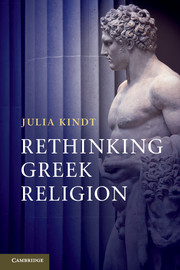Book contents
- Frontmatter
- Contents
- List of Figures
- Acknowledgements
- List of Abbreviations
- Introduction
- Chapter 1 Beyond the polis: rethinking Greek Religion
- Chapter 2 Parmeniscus’ journey: tracing religious visuality in word and wood
- Chapter 3 On tyrant property turned ritual object: political power and sacred symbols in ancient Greece and in social anthropology
- Chapter 4 Rethinking boundaries: the place of magic in the religious culture of ancient Greece
- Chapter 5 The ‘local’ and the ‘universal’ reconsidered: Olympia, dedications and the religious culture of ancient Greece
- Chapter 6 ‘The sex appeal of the inorganic’: seeing, touching and knowing the divine during the Second Sophistic
- Conclusion
- Bibliography
- Index
Chapter 5 - The ‘local’ and the ‘universal’ reconsidered: Olympia, dedications and the religious culture of ancient Greece
Published online by Cambridge University Press: 05 August 2012
- Frontmatter
- Contents
- List of Figures
- Acknowledgements
- List of Abbreviations
- Introduction
- Chapter 1 Beyond the polis: rethinking Greek Religion
- Chapter 2 Parmeniscus’ journey: tracing religious visuality in word and wood
- Chapter 3 On tyrant property turned ritual object: political power and sacred symbols in ancient Greece and in social anthropology
- Chapter 4 Rethinking boundaries: the place of magic in the religious culture of ancient Greece
- Chapter 5 The ‘local’ and the ‘universal’ reconsidered: Olympia, dedications and the religious culture of ancient Greece
- Chapter 6 ‘The sex appeal of the inorganic’: seeing, touching and knowing the divine during the Second Sophistic
- Conclusion
- Bibliography
- Index
Summary
Many are the sights to be seen in Greece, and many are the wonders to be heard: but on nothing does Heaven bestow more care than on the Eleusinian rites and the Olympic games.
PausaniasINTRODUCTION
In Chapter 1 I discussed the way in which polis religion is construed as extending to what scholars have called the ‘panhellenic’ dimension of ancient Greek religion. I argued that the ‘panhellenic’ is traditionally applied to describe a dimension of the religious in ancient Greece which transcended the level of individual poleis. As such it is frequently contrasted with those religious practices that were specific to a particular polis, that found no extension on the ‘panhellenic’ level, and that are therefore described as representing the ‘local’ dimension of ancient Greek religion. We speak of ‘local’ and ‘universal’ tellings of myth, for example, of ‘local’ and ‘panhellenic’ sanctuaries, of ‘local’ and ‘panhellenic’ festivals and so forth. In the absence of key organising principles of the religious such as a church, a dogma, a holy book and a creed, classical scholarship has conceptualised the fabric of ancient Greek religion around a bipolar model in which ‘the local’ (read: the polis) and ‘the universal’, or ‘panhellenic’ serve as opposing, yet mutually reinforcing, localisations of the religious.
- Type
- Chapter
- Information
- Rethinking Greek Religion , pp. 123 - 154Publisher: Cambridge University PressPrint publication year: 2012



